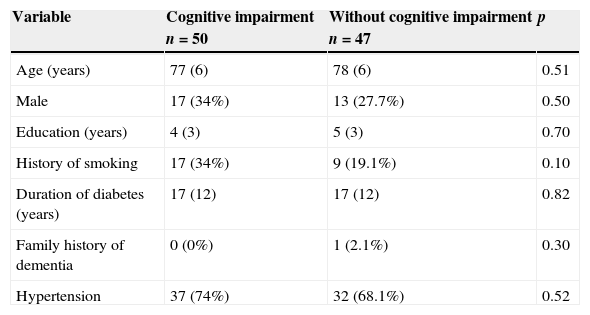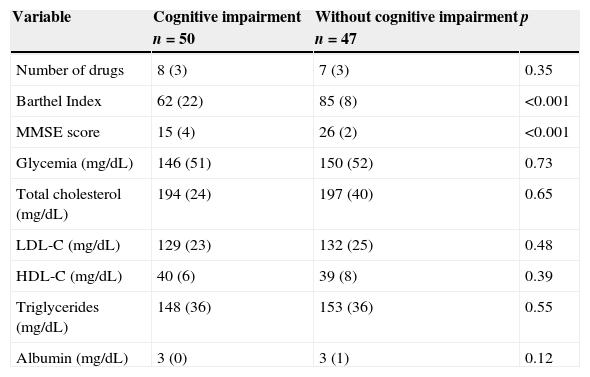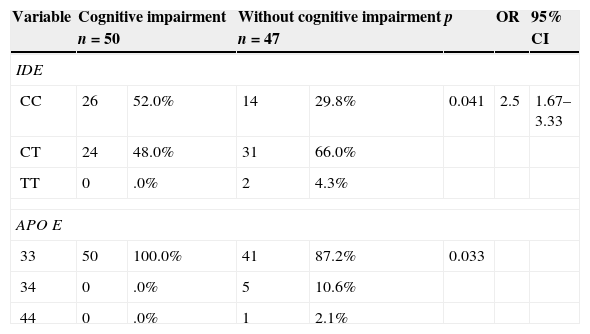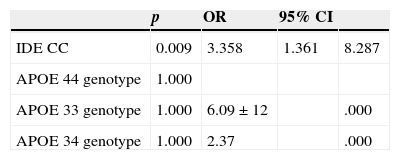In the last few decades we have witnessed an interesting transformation of the population pyramids throughout the world. As the population's life expectancy increases, there are more chronic diseases such as diabetes mellitus and dementias, and both of them have shown an association.
General objetive:To determine the association between Alzheimer's disease in diabetic patients and the insulin degrading enzyme in outpatients of a second level Hospital in Monterrey, Mexico.
Materials and methodsThis was a case control study in which we included outpatients from the Geriatrics Clinic of a Hospital in Northeastern Mexico. Cases were patients with a Mini Mental Score Exam (MMSE) below 24 and DSM-IV criteria for Dementia. Controls were patients who had MMSE scores greater than 24.
ResultsData from 97 patients were analyzed. Regarding physical examination and the results of laboratory tests, there were no differences between the two groups (p>0.05).
A 98% prevalence of the insulin degrading enzyme was documented in the sample studied. We found an association between a homozygous status for the CC genotype and Dementia with an estimated Odds Ratio (OR) of 2.5 (CI 95% 1.6–3.3) on the bivariate test, while, on the multivariate analysis, the OR was estimated 3.3 (CI 95% 1.3–8.2).
ConclusionsEvidence shows that cognitive impairment is more frequent among those exposed to the C allele of the rs2209972 SNP of the insulin degrading enzyme gene.
En las últimas décadas se ha producido una transformación en las pirámides poblacionales, con un aumento en la expectativa de vida, lo que conlleva un mayor número de enfermedades crónico-degenerativas, como son la diabetes mellitus y la demencia, que han mostrado tener una asociación estrecha, pero cuya etiología aún está por discernir.
El objetivo de este estudio fue determinar la asociación entre el alelo C de la enzima degradadora de insulina y la enfermedad de Alzheimer en pacientes con diabetes tipo 2.
Material y métodosEstudio de casos y controles, en el cual se incluyeron pacientes de la clínica de Geriatría del Hospital General del Noreste de México. Los casos fueron aquellos con una puntuación en el Mini-Mental State Examination (MMSE) menor de 24 y criterios para demencia de acuerdo con el DSM-IV. Los controles fueron pacientes con MMSE superior a 24.
ResultadosSe analizaron datos de 97 pacientes. No hubo diferencias respecto a las características basales clínicas y de laboratorio entre los casos y los controles (p>0,05).
Se documentó una prevalencia de 98% del alelo C de la enzima degradadora de insulina.
Encontramos una asociación entre homocigosidad para el genotipo CC de la enzima degradadora de insulina y enfermedad de Alzheimer, con una OR de 2,5 (IC 95% 1,6–3,3) en el examen bivariado, y en el examen multivariado se encontró asociación con una OR de 3,3 (IC 95% 1,3–8,2).
ConclusionesLa evidencia muestra una asociación entre deterioro cognitivo y presencia del alelo C del polimorfismo rs2209972 del gen de la enzima degradadora de insulina.










